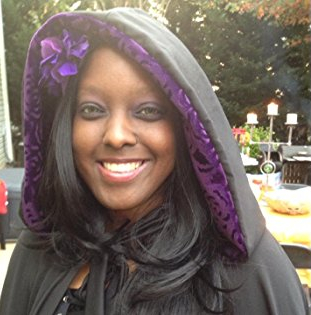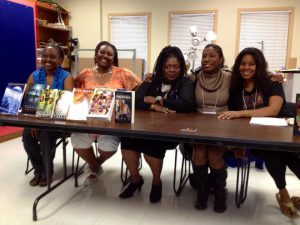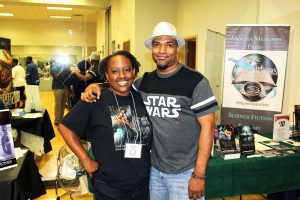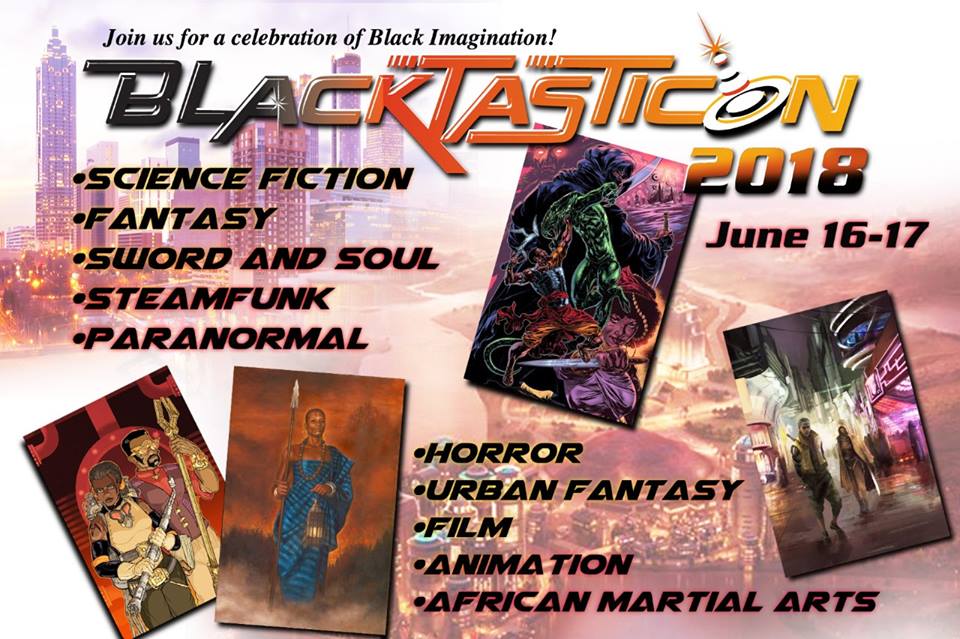by Melanie Crew
Managing Editor
The State of Black Science Fiction shouts “Welcome to the Future!” as co-founders Kool Kat Balogun Ojetade and Milton Davis bring you BLACKTASTICON 2018, Atlanta’s top-notch spec-lit convention (formerly known as The State of Black Science Fiction Con), this Saturday and Sunday (June 16-17) at GA Tech’s Ferst Center. This event is chock full of Afro-futurism, steamfunk, cyberfunk, dieselfunk, sword and soul, rococoa, Afrikan martial arts, and then some! So come on out and celebrate the diverse and ultra relevant voices of current black writers, artists, filmmakers, and creators of all kinds delivering some of the most dynamic and ground-breaking speculative fiction today, including our Kool Kat of the Week, Nicole Givens Kurtz.
Kurtz, Dream Realm, EPPIE and Fresh Voices in Science Fiction award finalist, delves deep into the speculative literature genre (sci-fi, horror, weird westerns, urban fantasy, etc.). Her short stories have been published in thirty plus anthologies including “KQ” (LOST TRAILS: FORGOTTEN TALES OF THE WEIRD WEST, VOL. 2 – wild west/horror), “Death’s Harvest” (STREET MAGICK ANTHOLOGY – urban fantasy); “Kanti’s Black Box” (THE MARTIAN ANTHOLOGY – science fiction), just to name a few. Kurtz is also the mastermind behind the CYBIL LEWIS and MINISTER KNIGHTS series. In addition to her prolific writing career, Kurtz is publisher and owner of Mocha Memoirs Press, brought to life in order to bring more diverse voices to the land of speculative fiction.
 ATLRetro caught up with North Carolina-based writer and frequent Atlanta visitor, Nicole Givens Kurtz, to find out more about her influences, her career in spec-lit, the need for diversity and representation, and the importance of BLACKTASTICON.
ATLRetro caught up with North Carolina-based writer and frequent Atlanta visitor, Nicole Givens Kurtz, to find out more about her influences, her career in spec-lit, the need for diversity and representation, and the importance of BLACKTASTICON.
ATLRetro: The first annual State of Black Science Fiction Convention was a hit with over 500 attendees and 40 vendors. Atlanta welcomes it back for another exciting year as Blacktasticon 2018 invades the south once again! As a guest and panelist at last year’s event, can you tell us a little about your experience and what you hope to gain this year?
Nicole Givens Kurtz: The first annual State of Black Science Fiction Convention was an awe-inspiring event. It also felt like a homecoming. Many of the people there I’ve known virtually via social media. There were hugs, laughter, and a great deal of support. One of the beautiful things about the convention resided in the warmth and promotion of black science fiction. It was ours. Here we were not the fringe of the convention, but the center, its heart. That paradigm shift hit me hard, and there were times when I looked out at the sea of black faces–faces like mine–that I wanted to weep in joy. I’ve never felt so included in a convention before.
Blacktasticon welcomes us to the future, a boundless and complex yet beautiful future. With the current state of politics, of the #metoo movement, of the societal woes and bloody wounds still saturating the present-day, what message do you hope current writers and creators bring to the table for future generations?
The overriding message I hope Blacktasticon delivers to future generations is that we (African-Americans) aren’t going anywhere. The future is full of black people, including women. We are a creative force, in all aspects of media, comics, movies, novels, and animation. This convention shows the future generations what we are capable of and what they can do. Those creative doors aren’t shut to them because of traditional gatekeepers. This goes beyond simply diversity, but the nuisances of the black collective. African-Americans aren’t a monolith, and here at this convention, all of those various talents are displayed.

Black Women in Sci-Fi Panel 2016 (l-r) Nicole Givens Kurtz, Alicia McCalla, Penelope Flynn, Kyoto M., Rennie Murphy
Do you feel it is the job of artists, writers and creators to represent what this world should be and could be? If so, which speculative fiction writer past or present would you say represents the most comprehensive ideal of how the world and its inhabitants should be?
Science fiction has always been political. Mary Shelley‘s FRANKENSTEIN is an absolute novel about hubris. So, yes, I do feel it is our job to tell stories, as humans have done since the beginning of time, since before written language. We tell stories to explain the world around us. That’s the role of artists, writers, and creators to continue to tell those stories, including what the world should be and what it could be. Past fiction writers that I feel offered the most comprehensive ideal of our world are classics such as Octavia Butler, Ray Bradbury, Ursula LeGuin, Zora Neale Hurston, and of course, Mary Shelley. There are modern writers of science fiction and fantasy who are representing the world as is or how it could be as well. N.K. Jemisin, Daniel Jose Older, Max Gladstone and anyone at Rosarium Publishing is presenting fabulous visions of the future.
Can you tell us how you got started writing? Did you start writing as a little girl? Or were you older when the writing bug bit you?
I’ve been writing stories before I could actually write words. When I was little, I would go up to my room and continue the stories I saw on television with my dolls or in my head. Once I learned to write, I would scribble the stories down, but it wasn’t until high school where I won a district wide essay contest that I realized I could make money from writing. I read everything I could get my hands on from elementary school onward. My mother encouraged me to keep reading and we spent many weekends at the public library checking out books. When I  became a teenager, I would skip the mall and spend my Saturday buried in books, gaining knowledge, and losing myself in other worlds.
became a teenager, I would skip the mall and spend my Saturday buried in books, gaining knowledge, and losing myself in other worlds.
Your Mocha Memoirs Press mission statement is “We believe representation in speculative fiction (science fiction, horror, fantasy) is not only important, but a necessity.” Can you tell our readers a little bit about Mocha Memoirs Press, LLC, and why you feel representation is essential?
Mocha Memoirs began as a way for me to funnel more diverse works into the world, where at the time, I saw a huge gap. The company began in 2010, and at that time, I did not see vary many science fiction works that reflected people of color, women, or black women in particular. Often when I attended conventions with my first novel, I was the only black person there at all, let alone actually selling my published novel. In an effort to give back but also bring awareness to the diverse stories we can tell, I started Mocha Memoirs Press. Representation is essential because it provides positive self affirmation. Essentially, seeing oneself in media as a hero, heroine, or protagonists demonstrates to the reader/viewer, “You matter. You exist. This future is yours and you have a place in it. This story could be your story.” Everyone wants to be valued. Representation should reflect the diversity of our world.
We see that you’ve had work published in LOST TRAILS: FORGOTTEN TALES OF THE WEIRD WEST, LAWLESS LANDS, and STRAIGHT OUTTA TOMBSTONE, to name a few. Can you tell us about your love of westerns (the weirder the better) and how living in New Mexico influenced your writing?
Prior to moving to New Mexico, I lived in a variety of other places (San Diego, Chicago, Louisville) but nothing took root inside me the way the Land of Enchantment did. My mother was always a western fan, and in our household, I grew up with Clint Eastwood, SHANE, and THE RIFLEMAN. To this day, my mother still sits and watches westerns. Imagine a young black girl in a housing project watching these men settle scores with the fastest pistols in the west. As a writer, my weird western stories are rooted in the theme of freedom. This place, the west, specifically, the southwest, thrived with a diverse group of people–Native Americans, Chinese immigrants, freed slaves, and of  course, wealthy Eastern whites; each having to work together to scrape out a life in this harsh, new environment, and in doing so crafted an entirely different way of life, of culture, unlike those in the East. Those differences still resonate through to this day. That’s why I write weird westerns.
course, wealthy Eastern whites; each having to work together to scrape out a life in this harsh, new environment, and in doing so crafted an entirely different way of life, of culture, unlike those in the East. Those differences still resonate through to this day. That’s why I write weird westerns.
You’ve had short stories published in over thirty anthologies ranging from science fiction to horror and have had your novels become finalists for several awards, such as the EPPIES, Dream Realm and Fresh Voices in Sci-Fi. If you had to choose a favorite short story or novel from your bibliography, which would you choose and why?
This is like asking me to pick my favorite child! Of all the short stories I’ve written, “Belly Speaker,” is my favorite. It’s my favorite because it is a weird western, but it is about finding one’s voice when others threaten to silence it. My favorite novel, of the ones I’ve written, is DEVOURER. In this second MINISTER KNIGHTS OF SOULS novel, Akub seeks to redeem herself from her violent past by doing something criminal. I’m interested in redemption and how we overcome the actions of our past.
Which writer from the past and which writer from the present has influenced and continues to influence you the most and what is it about them that draws them to you?
The writer from my past that influenced me the most is Stephen King. Most of my stories have their roots in weird, strange horror. Even if they’re science fiction stories, horrific things happen in them. Robert B. Parker, Sue Grafton, Zora Neale Hurston, and classic literature such as Shirley Jackson, Alice Walker, and of course, Octavia Butler have all influenced me.
 Having had the pleasure of experiencing your panels at last year’s convention, we know you’re not only a killer storyteller, but you’re also a spooky horror film junkie and fanatic like us! Can you tell us your favorite horror movie and why it ranks at the top of your list?
Having had the pleasure of experiencing your panels at last year’s convention, we know you’re not only a killer storyteller, but you’re also a spooky horror film junkie and fanatic like us! Can you tell us your favorite horror movie and why it ranks at the top of your list?
My favorite horror movie of all time is MY BLOODY VALENTINE, the remake. Don’t judge me! Prior to that movie, my favorite horror films were from the 1980s: LOST BOYS, FRIGHT NIGHT and HELLRAISER. I still watch these films on streaming media whenever I need a good scare.
As a writer working in the science-fiction, fantasy and horror genres, what challenges have you personally faced that seem to be a common theme among women, especially women of color in the industry?
When I began my career in science fiction publishing in 2005, the challenges were getting past the gatekeepers at major publishing companies to even look at my work. So many rejections of “Cannot identify with this character,” and “Nice concept, can’t sell it.” The perception that black protagonists wouldn’t sell or that readers who weren’t black couldn’t identify with a non-white protagonist in science fiction was astounding to me. This same genre where people could identify with shapeshifting tigers, but not another human being, continues to be the drumbeat for certain editors and publishers today. The difference today (14 years later) is the convenience of small press publishing, electronic book publishing, and self publishing options that allows my work to by-pass some of those gatekeepers. Conventions like Blacktasticon help me market and connect to readers who are hungry for those stories.
Can you give us five things you’re into at the moment that we should be watching, reading or listening to right now— past or present, well-known or obscure?
Five things I’m in to right now are: 1) CLOAK & DAGGER on Freeform/Hulu; 2) ALTERED CARBON-the series with Kovacs is a good cyberpunk series; 3) Sting’s TEN SUMMONER’S TALES is always in rotation; 4) Andrea Botticelli is also in heavy rotation; and 5) ROUTE 3 by Robert Jeffery is a comic series that I’m eagerly awaiting the next installment.
Any advice for women writers out there trying to get their foot in the door?
DO.NOT.SETTLE. I wish I would’ve stuck to this advice at the onset of my career. Don’t settle. Do your research because this business requires a great deal of patience. Know what you want and do not settle for anything less.
Getting back to what brought us here, Blacktasticon 2018! Is there anything exciting you have planned for attendees? Can you give us a sneak peek into the panels you’ll be sitting on?
My press, Mocha Memoirs, will have special package pricing just for the convention. I’m on the Women in Black Speculative Fiction panel, which I’m very excited to be a part of again. Last time we had standing room only!
And last but not least, what are you currently working on and how can we get our hands on it?
I’m currently working on finishing a novella, that’s romance and fantasy. Afterwards, I’m diving back into my Cybil Lewis Science Fiction Mystery series. Then later this year, I’ll be working on my weird western short story collection.
Photos courtesy of Nicole Givens Kurtz and used with permission.


